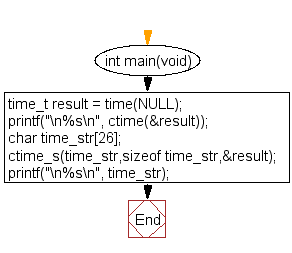C Exercises: Convert a time_t object to a textual representation
C Date Time: Exercise-3 with Solution
Write a program in C to convert a time_t object to a textual representation.
Sample Solution:
C Code:
#define __STDC_WANT_LIB_EXT1__ 1
#include <time.h>
#include <stdio.h>
int main(void)
{
time_t result = time(NULL);
printf("\n%s\n", ctime(&result));
#ifdef __STDC_LIB_EXT1__
char time_str[26];
ctime_s(time_str,sizeof time_str,&result);
printf("\n%s\n", time_str);
#endif
}
Sample Output:
Thu Aug 03 13:44:49 2017
N.B.: The result may varry for your current system date and time.
Flowchart:

C Programming Code Editor:
Contribute your code and comments through Disqus.
Previous: Write a program in C to compute the number of seconds passed since the beginning of the month.
Next: Write a program in C to convert a tm object to custom textual representation.
What is the difficulty level of this exercise?
Test your Programming skills with w3resource's quiz.
C Programming: Tips of the Day
Static variable inside of a function in C
The scope of variable is where the variable name can be seen. Here, x is visible only inside function foo().
The lifetime of a variable is the period over which it exists. If x were defined without the keyword static, the lifetime would be from the entry into foo() to the return from foo(); so it would be re-initialized to 5 on every call.
The keyword static acts to extend the lifetime of a variable to the lifetime of the programme; e.g. initialization occurs once and once only and then the variable retains its value - whatever it has come to be - over all future calls to foo().
Ref : https://bit.ly/3fOq7XP
- New Content published on w3resource:
- HTML-CSS Practical: Exercises, Practice, Solution
- Java Regular Expression: Exercises, Practice, Solution
- Scala Programming Exercises, Practice, Solution
- Python Itertools exercises
- Python Numpy exercises
- Python GeoPy Package exercises
- Python Pandas exercises
- Python nltk exercises
- Python BeautifulSoup exercises
- Form Template
- Composer - PHP Package Manager
- PHPUnit - PHP Testing
- Laravel - PHP Framework
- Angular - JavaScript Framework
- Vue - JavaScript Framework
- Jest - JavaScript Testing Framework
